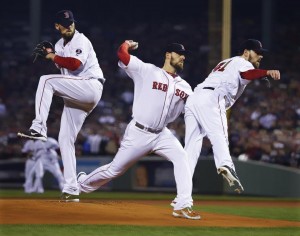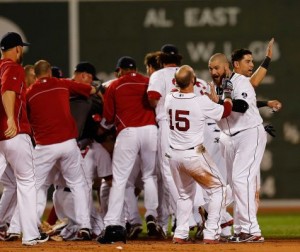I know, I know. It’s Friday. The World Series ended Wednesday night. We should forget about it as quickly as possible and get on to the next entertainment fix, just as we trash the orange and black from the malls and get the reindeer prancing and Santa selling. I beg to differ. (I stomp my feet and holler to differ.) I had an odd and possibly interesting view of the high baseball holy days from China, and here’s what some of it looked like. This is the third in my World Series Series (the first was here).
“They are three outs away from winning the World Series, ” Dan Shulman suavely said into my earphones in Room 501. He’s a microphone pro, one of the best narrators in the world of sports, and though smooth as always, a younger man’s glee at looming victory was tangible in his voice. (He’s also Canadian, I may have pointed out before, as is Jonah Keri, the author of this excellent recap of Boston’s road to victory. Mine’s a narrower, more idiosyncratic take, while Keri gets inside baseball as well as anybody I’ve read.) I was with Shulman and fellow commentator Orel Hershiser, plus tens of thousands of screaming BoSoxian crazies, and who knows how many eavesdroppers via ESPN Radio, but I couldn’t have been much more alone in my hunger for baseball.
501 is the Chinese teachers’ workroom in the small economics college of a thoroughly average university in northeastern China. There were no tacos, no high fives and no between-innings arguments. (For most of the hour or so I was there, there wasn’t even another human.) I hadn’t been able to find another foreigner with any baseball interest to share the “October Classic” with. Well, except for a chance hallway encounter, the first time I’d seen her this fall, with Linda – a wonderfully eccentric management teacher/former lawyer/current third trombone in a Dalian big band/one-time resident of hardball-crazy St. Louis who relied on Facebook updates, mediated through a Great Firewall-jumping private network, for her World Series coverage. Plus, Linda was on her way to class. The Internet hadn’t worked in my classroom after my 8 am learned discourse on food words, “Can’t Buy Me Love” and Hamlet’s dithering about whether To Be or not. There are no American-themed sports bars in my corner of China, and the foreign teachers’ nook, as usual, was cut off from the life-giving Web.
Put that together with John Lackey’s efficient pitching for the Boston Red Sox, and they were midway through the eighth inning of the final Series game before I showed up in room 501, the cheapest of cheap seats. (Side note the first: tickets for this game were being resold for over $2000. This, in the middle of an economic crisis in which not everybody is suffering. Rich-getting-richer alert.) (Side note the second: the pitching star’s name is Lackey– what a strange handle for a sporting hero, and what a cruel and tempting tag it must have been when he was so recently the object of the scornful booing of Boston fans,

Not lacking *this* year. When he tipped his cap to the fans on leaving Game 7, it’s said to be the first time he’d done that in Boston. Winning heals all wounds.
especially in 2011. His name combines insufficiency with servility. How does a family come to be saddled with cringe-worthy nomenclature like that? Settle down, Howdy. It’s just a name.)
As the Sox came to bat in the bottom of the eighth, history loomed in Shulman’s baritone: “1918 was the last time the Bosox won the Series in Boston.” More so than in any other sport – only hockey comes close in North America, and that mainly for Canadians – baseball bleeds history. That Boston team had a fine young left-handed pitcher named Babe Ruth, and maybe you’ve heard of him. They traded him to the Yankees, and the rest of the 20th century was tough for Boston baseball; the so-called “Curse of the Bambino” loomed over Fenway Park until the Red Sox finally won again in 2004 and then again in ’07, both times clinching victory on the road. And speaking of history and the sanctity of tradition, nearly 100 years later they still use wooden bats; baseball gets some things amazingly right.
My ESPN feed was shaky in Room 501, and cut in and out, but was actually listenable for significant stretches, much better than I’d managed for Game 5. Between innings, I heard a talking head excerpt from another ESPN program. (Wait, “talking head” is a TV reference, so this would’ve been No Head Talking.¹) “Yeah, I’m suspicious!” Unknown SportsTalk Host was nearly shouting. If you didn’t hear, David Ortiz had an incredible
performance in the Series at age 37, and this guy (pick one) had the guts to wonder if performance-enhancing drugs were part of Big Papi’s astounding playoffs or (door number two) was making a blatant ratings grab by swinging hard at a beloved, cuddly star. That was a bit of a parade-soaking rain, but I was surprised that I still hadn’t been carrying an umbrella. I hadn’t known, or had conveniently forgotten, that Ortiz had been implicated years ago along with the now-nearly-tarred-and-feathered Alex Rodriguez as a steroid user. (We now return to the ESPN telecast, at least when it’s not cutting out.)
Yeah, the radio signal was better, but still irritating. St. Louis was batting, top of the 8th (I think; sometimes the feed was live, and other times it was delayed), their first run in, bases loaded, and Shulman said, “There’s the pitch AND IT’S –“ dead air. I scrambled, went to another tab, hit buttons galore, but it was another 30 seconds before I caught up with “—sharply hit but right at Napoli, he tosses to Tazawa for the third out.” That was that for the Cardinals, pretty much. The Sox did little in the bottom of eight, and the Cards succumbed to the seemingly inevitable As The World Waited (at least the rather limited portion of it that speaks balls and strikes, outs and homers). I missed most of this, trying to catch the perfect radio wave.
“Uehara rubs up the baseball…” Shulman’s back! Two out. I-phone flashbulbs were popping. The extra Red Sox pitchers in the outfield bullpen, the baritone reported, were “itching to run on the field to join the party”. ESPN went silent. Minutes went by, and then I heard the roars. “…a strikeout to end it,” shouted Hershiser over the ecstatic din of the crowd. Deadness. Then I heard part of Shulman’s summary. “They had talent, there’s no doubt about it, but they also had character and grit…and this interesting, colourful group of players has done it, they have won the World Series…” ESPN’s microphones were on the field so that we could hear from these players, answering, as one irreverent observer had it, variations on the same question: What is it like to be YOU?
“I come to work every day in a museum,” said newly minted Sox outfielder Johnny Gomes. (He meant this as a compliment to the history of Fenway.) Tell me how it feels, Mike Napoli: “It feels unbelievable…We’re like family, and we come out and played together on the field. It shows what we did…” (What? Mr. Napoli is more articulate with 33 ounces of ash in his hands. He maybe needed a second take on this interview, but he doesn’t care.) Others offered: “we played our game”; “didn’t try to do too much”; “got the job done”; “it’s unbelievable” (a popular choice). “Xander Bogaerts, you’re 21 years old and you’re a World Series champion!” (This was not a question, you’ll notice, and the young man is from Latin America, but he already speaks pretty good Ballplayer.) “It’s unbelievable,” he began, but before he could say much more, the show producers cut off the rookie Latino’s dissertation because another reporter had Red Sox star Dustin Pedroia at mic-point: “There’s a ton of

The boys in full-on jumping-up-and-down mode. Winning! 15, the little bald guy, is Pedroia, their brilliant leader and second baseman.
guys that did something special. It’s a total team effort….” He was deflecting individual praise, like an old-fashioned ballplayer, and he also downplayed the storied team spirit and dedication that he shows by regularly hitting the clubhouse seven hours ahead of game time: “We’re baseball players. It’s what we do.”
“I’ll tell you what” can’t be forgotten. Boston manager John Farrell threw out two of them inside his first dozen words, which isn’t easy (try it, I dare you), and several more followed, though as a rule he tries to use it only once per sentence. He will tell them WHAT. It’s an interesting American expression. “We answered every challenge along the way. We came together as a team. And I’ll tell you what—“ Before the next what could be told, though, the feed froze. Several key clichés were cut off, bromides were bounced, and banalities were temporarily banished. On return, it was the formerly much-despised, now suddenly heroic pitcher John Lackey adding a little growl of originality. He did fine with “What does it feel like to be a World Series champion?” (it feels really great, unbelievable) but got just slightly surly when the mic-man tried to get journalistic, asking about his rehab after surgery and his reduced weight and increased fitness, how much difference did–? “To be honest, I’m tired of talking about that. I pitched well, things are good….It’s a special group of guys.” I heard Leave me the hell alone but that might’ve just been my unusual Internet connection.
“It’s unbelievable. I mean, it’s an unbelievable feeling…” began free agent centre fielder Jacoby Ellsbury, before turning to wider thoughts of community and responsibility. He mentioned “Boston Strong”, alluding to the consolation, the rebuilt confidence of a city after the fear and carnage of last spring’s Boston Marathon bombing. Sports had a lot to do with that determined coming together of the people of Boston, and while a Red Sox victory can’t heal everything or refute terrorism, there was no doubt that this likeable, surprisingly successful team was an emotional tonic. (Beyond that, in a city that is notoriously hard on its local celebrities, there was also the petty tragedy that last year’s Bosox were awful, even a civic embarrassment, so this was another kind of high-profile urban renewal.) “They rallied around so many things. They rallied around each other,” Hershiser said. The wacky, rather 19th-century-style beards that some of them wore were just a symbol of what was repeated by players and microphone holders alike: these gritty, unselfish guys loved to play together and loved to play. There was this, too from Shulman: “It will be a long, long time before we see another World Series performance like the one we saw from David Ortiz.”
If he ever was to test positive, though? Yikes. And already, there’s free agency talk. Teams don’t stay together. Even the Cardinals, famed for their incredible build-from-within ethic, have 18 new players this year from two years ago’s World Series team. But there I go again, letting reality intrude on a fairy tale ending. I liked catching whatever little glimpses I could get of the Series. I’ve been missing baseball, and I’d love to be able to watch. There’s always next year.

